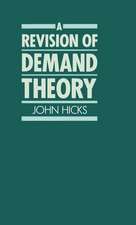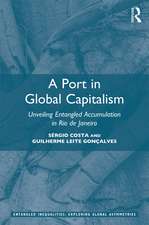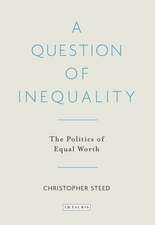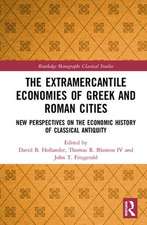An Inquiry Into the Nature and Causes of the Wealth of Nations
Autor Adam Smith Editat de C. J. Bullock, Charles W. Elioten Limba Engleză Paperback – 31 ian 2010
Preț: 190.89 lei
Nou
Puncte Express: 286
Preț estimativ în valută:
36.54€ • 39.70$ • 30.71£
36.54€ • 39.70$ • 30.71£
Carte tipărită la comandă
Livrare economică 21 aprilie-05 mai
Preluare comenzi: 021 569.72.76
Specificații
ISBN-13: 9781616400552
ISBN-10: 1616400552
Pagini: 592
Dimensiuni: 140 x 216 x 34 mm
Greutate: 0.74 kg
Editura: COSIMO CLASSICS
ISBN-10: 1616400552
Pagini: 592
Dimensiuni: 140 x 216 x 34 mm
Greutate: 0.74 kg
Editura: COSIMO CLASSICS
Notă biografică
Adam Smith is a native North Texas Entrepreneur, AI educational expert, and educator who graduated from Embry Riddle University with a Bachelor of Science in Aerospace Studies. In 2007 he co-founded TeacherTube.com, an online education platform community that provides an educationally focused, safe venue for teachers, schools, and home learners. Under his leadership, in September of 2017, a publicly traded company, Salem Media Group, acquired TeacherTube.
After the acquisition, Adam continued his passion for technology and education by helping schools and start-ups to large corporations with digital consulting.
After the acquisition, Adam continued his passion for technology and education by helping schools and start-ups to large corporations with digital consulting.
Descriere
Descriere de la o altă ediție sau format:
This edition contains generous selections from all five volumes of The Wealth of Nations, and places Smith's inquiry into its historical, intellectual, and cultural context. ABOUT THE SERIES: For over 100 years Oxford World's Classics has made available the widest range of literature from around the globe. Each affordable volume reflects Oxford's commitment to scholarship, providing the most accurate text plus a wealth of other valuable features, including expert introductions by leading authorities, helpful notes to clarify the text, up-to-date bibliographies for further study, and much more.
This edition contains generous selections from all five volumes of The Wealth of Nations, and places Smith's inquiry into its historical, intellectual, and cultural context. ABOUT THE SERIES: For over 100 years Oxford World's Classics has made available the widest range of literature from around the globe. Each affordable volume reflects Oxford's commitment to scholarship, providing the most accurate text plus a wealth of other valuable features, including expert introductions by leading authorities, helpful notes to clarify the text, up-to-date bibliographies for further study, and much more.
Recenzii
the selection of material is judicious and the commentary brilliant and entertaining
Cuprins
Volume One
Preface, 1976, by George J. Stigler
Preface
Editor's Introduction
Introduction and Plan of the work
Book 1
Of the Causes of Improvement in the productive Powers of Labour, and of the Order according to which its Produce is naturally distributed among the different Ranks of the People
1. Of the Division of Labour
2. Of the Principle which gives Occasion to the Division of Labour
3. That the Division of Labour is Limited by the Extent of the Market
4. Of the Origin and Use of Money
5. Of the Real and Nominal Price of Commodities, or of their Price in Labour, and their Price in Money 6. Of the Component Parts of the Price of Commodities
7. Of the Natural and Market Price of Commodities
8. Of the Wages of Labour
9. Of the Profits of Stock
10. Of Wages and Profit in the Different Employments of Labour and Stock
Part I - Inequalities arising from the Nature of the Employments themselves
Part II - Inequalities occasioned by the Policy of Europe
11. Of the Rent of Land
Part I - Of the Produce of Land which always affords Rent
Part II - Of the Produce of Land which sometimes does, and sometimes does not afford Rent
Part III - Of the Variations in the Proportion between the respective Values of that Sort of Produce which always affords Rent, and of that which sometimes does and sometimes does not afford Rent
Digression concerning the Variations in the Value of Silver during the Course of the Four last Centuries: First Period, 1350-1570
Second Period, 1570-1640
Third Period, 1637-1776
Variations in the Proportion between the respective Values of Gold and Silver
Grounds of the Suspicion that the Value of Silver still continues to decrease
Different Effects of the Progress of Improvement upon three different Sorts of rude Produce
First Sort
Second Sort
Third Sort
Conclusion of the Digression concerning the Variations in the Value of Silver
Effects of the Progress of Improvement upon the real Price of Manufactures
Conclusion of the Chapter
Book II
Of the Nature, Accumulation, and Employment of Stock
Introduction
1. Of the Division of Stock
2. Of Money Considered as a particular Branch of the General Stock of the Society, or of the Expence of Maintaining the National Capital
3. Of the Accumulation of Capital, or of Productive and Unproductive Labour
4. Of Stock Lent at Interest
5. Of the Different Employment of Capitals
Book III
Of the different Progress of Opulence in different Nations
1. Of the Natural Progress of Opulence
2. Of the Discouragement of Agriculture in the Ancient State of Europe after the Fall of the Roman Empire
3. Of the Rise and Progress of Cities and Towns, after the Fall of the Roman Empire
4. How the Commerce of the Towns Contributed to the Improvement of the Country
Book IV
Of Systems of Political Economy
Introduction
1. Of the Principle of the Commercial or Mercantile System
2. Of Restraints upon the Importation from Foreign Countries of such Goods as can be Produced at Home
3. Of the extraordinary Restraints upon the Importation of Goods of almost all Kinds, from those Countries with which the Balance is supposed to be Disadvantageous
Part I - Of the Unreasonableness of those Restraints even upon the Principles of the Commercial System
Digression concerning Banks of Deposit, particularly concerning that of Amsterdam
Part II - Of the Unreasonableness of those extraordinary Restraints upon other Principles
Volume Two
Book IV
4. Of Drawbacks
5. Of Bounties
Digression concerning the Corn Trade and Corn Laws
6. Of Treaties of Commerce
7. Of Colonies
Part I - Of the Motives for establishing new Colonies
Part II - Causes of the Prosperity of new Colonies
Part III - Of the Advantages which Europe has derived from the Discovery of America, and from that of a Passage to the East Indies by the Cape of Good Hope
8. Conclusion of the Mercantile System
9. Of the Agricultural Systems, or of those Systems of Political (Economy, which Represent the Produce of Land as either the Sole or the Principal Source of the Revenue and Wealth of Every Country
Book V
Of the Revenue of the Sovereign or Commonwealth
1. Of the Expences of the Sovreign or Commonwealth
Part I - Of the Expence of Defence
Part II - Of the Expence of Justice
Part III - Of the Expence of public Works and public Institutions
Article 1st - Of the public Works and Institutions for facilitating the Commerce of the Society
1st, For facilitating the general Commerce of the Society
2dly, For facilitating particular Branches of Commerce
Article 2d - Of the Expence of the Institutions for the Education of Youth
Article 3d - Of the Expence of the Institutions for the Instruction of People of All Ages
Part IV - Of the Expence of supporting the Dignity of the Sovereign Conclusion of the Chapter
2. Of the Sources of the General or Public Revenue of the Society
Part I - Of the Funds or Sources of Revenue which may peculiarly belong to the Sovereign or Commonwealth
Part II - Of Taxes
Article 1st - Taxes upon Rent. Taxes upon the Rent of Land
Taxes which are proportioned, not to the Rent, but to the Produce of Land
Taxes upon the Rent of Houses
Article 2d - Taxes upon Profit, or upon the Revenue arising from Stock
Taxes upon the Profit of particular Employments
Appendix to Articles 1st and 2d - Taxes upon the capital Value of Lands, Houses, and Stock
Article 3d - Taxes upon the Wages of Labour
Article 4th - Taxes which, it is intended, should fall indifferently upon every different Species of Revenue
Capitation Taxes
Taxes upon consumable Commodities
3. Of Public Debts
Appendix on the Herring Bounty
Index I - Subjects
Index II - Authorities
Preface, 1976, by George J. Stigler
Preface
Editor's Introduction
Introduction and Plan of the work
Book 1
Of the Causes of Improvement in the productive Powers of Labour, and of the Order according to which its Produce is naturally distributed among the different Ranks of the People
1. Of the Division of Labour
2. Of the Principle which gives Occasion to the Division of Labour
3. That the Division of Labour is Limited by the Extent of the Market
4. Of the Origin and Use of Money
5. Of the Real and Nominal Price of Commodities, or of their Price in Labour, and their Price in Money 6. Of the Component Parts of the Price of Commodities
7. Of the Natural and Market Price of Commodities
8. Of the Wages of Labour
9. Of the Profits of Stock
10. Of Wages and Profit in the Different Employments of Labour and Stock
Part I - Inequalities arising from the Nature of the Employments themselves
Part II - Inequalities occasioned by the Policy of Europe
11. Of the Rent of Land
Part I - Of the Produce of Land which always affords Rent
Part II - Of the Produce of Land which sometimes does, and sometimes does not afford Rent
Part III - Of the Variations in the Proportion between the respective Values of that Sort of Produce which always affords Rent, and of that which sometimes does and sometimes does not afford Rent
Digression concerning the Variations in the Value of Silver during the Course of the Four last Centuries: First Period, 1350-1570
Second Period, 1570-1640
Third Period, 1637-1776
Variations in the Proportion between the respective Values of Gold and Silver
Grounds of the Suspicion that the Value of Silver still continues to decrease
Different Effects of the Progress of Improvement upon three different Sorts of rude Produce
First Sort
Second Sort
Third Sort
Conclusion of the Digression concerning the Variations in the Value of Silver
Effects of the Progress of Improvement upon the real Price of Manufactures
Conclusion of the Chapter
Book II
Of the Nature, Accumulation, and Employment of Stock
Introduction
1. Of the Division of Stock
2. Of Money Considered as a particular Branch of the General Stock of the Society, or of the Expence of Maintaining the National Capital
3. Of the Accumulation of Capital, or of Productive and Unproductive Labour
4. Of Stock Lent at Interest
5. Of the Different Employment of Capitals
Book III
Of the different Progress of Opulence in different Nations
1. Of the Natural Progress of Opulence
2. Of the Discouragement of Agriculture in the Ancient State of Europe after the Fall of the Roman Empire
3. Of the Rise and Progress of Cities and Towns, after the Fall of the Roman Empire
4. How the Commerce of the Towns Contributed to the Improvement of the Country
Book IV
Of Systems of Political Economy
Introduction
1. Of the Principle of the Commercial or Mercantile System
2. Of Restraints upon the Importation from Foreign Countries of such Goods as can be Produced at Home
3. Of the extraordinary Restraints upon the Importation of Goods of almost all Kinds, from those Countries with which the Balance is supposed to be Disadvantageous
Part I - Of the Unreasonableness of those Restraints even upon the Principles of the Commercial System
Digression concerning Banks of Deposit, particularly concerning that of Amsterdam
Part II - Of the Unreasonableness of those extraordinary Restraints upon other Principles
Volume Two
Book IV
4. Of Drawbacks
5. Of Bounties
Digression concerning the Corn Trade and Corn Laws
6. Of Treaties of Commerce
7. Of Colonies
Part I - Of the Motives for establishing new Colonies
Part II - Causes of the Prosperity of new Colonies
Part III - Of the Advantages which Europe has derived from the Discovery of America, and from that of a Passage to the East Indies by the Cape of Good Hope
8. Conclusion of the Mercantile System
9. Of the Agricultural Systems, or of those Systems of Political (Economy, which Represent the Produce of Land as either the Sole or the Principal Source of the Revenue and Wealth of Every Country
Book V
Of the Revenue of the Sovereign or Commonwealth
1. Of the Expences of the Sovreign or Commonwealth
Part I - Of the Expence of Defence
Part II - Of the Expence of Justice
Part III - Of the Expence of public Works and public Institutions
Article 1st - Of the public Works and Institutions for facilitating the Commerce of the Society
1st, For facilitating the general Commerce of the Society
2dly, For facilitating particular Branches of Commerce
Article 2d - Of the Expence of the Institutions for the Education of Youth
Article 3d - Of the Expence of the Institutions for the Instruction of People of All Ages
Part IV - Of the Expence of supporting the Dignity of the Sovereign Conclusion of the Chapter
2. Of the Sources of the General or Public Revenue of the Society
Part I - Of the Funds or Sources of Revenue which may peculiarly belong to the Sovereign or Commonwealth
Part II - Of Taxes
Article 1st - Taxes upon Rent. Taxes upon the Rent of Land
Taxes which are proportioned, not to the Rent, but to the Produce of Land
Taxes upon the Rent of Houses
Article 2d - Taxes upon Profit, or upon the Revenue arising from Stock
Taxes upon the Profit of particular Employments
Appendix to Articles 1st and 2d - Taxes upon the capital Value of Lands, Houses, and Stock
Article 3d - Taxes upon the Wages of Labour
Article 4th - Taxes which, it is intended, should fall indifferently upon every different Species of Revenue
Capitation Taxes
Taxes upon consumable Commodities
3. Of Public Debts
Appendix on the Herring Bounty
Index I - Subjects
Index II - Authorities























